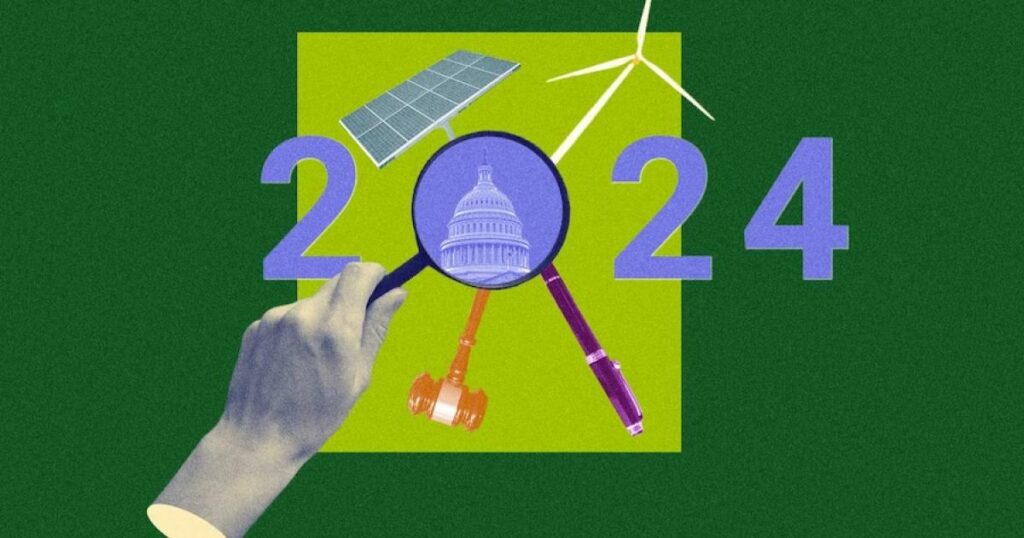Climate policies sustainability executives need to track in 2024
4 min read
The Inflation Reduction Act. A UK carbon tax. A US-China climate agreement. 2023 saw a slew of unprecedented climate policies affect the sustainability marketplace, and 2024 isn’t indicating any slowdown.
Here are the most pressing and immediate developments and regulations to track in the year ahead.
 Inflation Reduction Act
Inflation Reduction Act
Companies should be aware that the Inflation Reduction Act (IRA), passed in August 2022, has a few changes planned for 2024.
Tax credits vs tech neutral: The Investment Tax Credit (ITC) and Production Tax Credit (PTC) mechanisms allow businesses to deduct a certain amount of the cost of specific renewable energy systems. “An interesting transition between 2024 and 2025, related to the expiration of certain technology specific tax credits, [will be] the ITC and PTC transition to tech neutral,” said Lesley Jantarasami, managing director of the energy program at the Bipartisan Policy Center think tank.
Through 2024, the structure for the ITC and PTC will remain the same. Businesses can use technologies such as solar arrays, wind turbines, energy storage and microgrid controllers, and they will continue to qualify for either the ITC or PTC credit. But beginning in 2025, “tech neutral” means that it will no longer matter which technology companies use to generate renewable energy — only the energy generation emits no greenhouse gases.
“[The credit] is not specific to the technology itself but rather, you would get a tax credit on the basis of whether it’s a zero emissions technology that is producing the electricity,” Jantarasami said.
Sustainable aviation fuel: On Dec. 15, the U.S. Treasury Department released new guidance regarding the sustainable aviation fuel (SAF) tax credits included in the IRA. The original language of the credit excludes corn ethanol or other biofuels as SAF, favoring biomass-based material instead. The Treasury’s update seemingly opens the door to qualifying crop-based alternatives as SAF.
The announcement drew some condemnation from industry experts. “Reducing aviation emissions is challenging but incentivizing the use of crop-based jet fuel is certainly not going to help the sector,” Dan Lashof, director of the World Resources Institute, said in a statement. Biofuels and other crop-based ethanol require additional plots of lands and resources, a factor that leads many within the industry to disregard the option altogether.
President Joe Biden is scheduled to update the SAF methodology March 1.
Hydrogen: The IRA’s 45V Hydrogen Production Tax Credit received new tax rules Dec. 22 specifying production requirements to qualify as “clean” hydrogen. Until now, the credit allowed up to $3 per kilogram of hydrogen produced with limited greenhouse gas emissions. New guidance from the Treasury Department, however, calls for excluding all hydrogen production that isn’t powered by low-carbon or zero-emissions energy.
“It’s going to be a little bit more limited and restricted to certain forms of inputs for the clean hydrogen credit,” said Jantarasami.
Specifically, companies looking to claim the credit will immediately have to shift over to a clean electricity supply created in the same region as the hydrogen.
California emissions disclosures vs. SEC
The Climate Corporate Data Accountability Act — commonly referred to as SB 253 — and the Climate-Related Financial Risk Act — known as SB 261 — will require a structural shift from companies based in California.
Beginning in 2026, under SB 253 companies with revenues larger than $1 billion will have to report Scope 1 and 2 emissions, with Scope 3 following in 2027.
Also at the start of 2026, SB 261 requires companies with annual revenues larger than $500 million to disclose financial risks associated with climate change, and how they plan to address them, biannually.
“In terms of the two laws in California, even though the effective date is 2026 to report on their 2025 data, companies really should start getting ready in 2024,” said Jenny Brusgul, ESG advisory practice leader at CohnReznick.
Brusgul continued that companies need to take advantage of 2024 to “start conducting an initial gap assessment [to] really understand the requirements” of the new disclosure laws — especially as new federal disclosure requirements are right around the corner.
The Securities and Exchange Commission (SEC) has been deliberating on emissions disclosure requirements as well. Originally due to finalize U.S. company emission disclosures in October, the SEC pushed back the official ruling to April with its newly announced timeline.
The California laws and the proposed SEC law, with two exceptions — the type of emissions reported and the company required to report at all.
The SEC proposal, similar to its California counterpart, would require companies to report Scope 1 and Scope 2 emissions. But where SB 253 will require Scope 3 disclosure by 2027, the SEC’s proposal only requires disclosure by companies with stated Scope 3 emissions reductions goals.
The second deviation falls to how a company is held. The SEC would only require public companies to disclose, while CA 253 and 261 require both public and private companies to comply.
We’ll continue to report on both domestic and international policies that affect the sustainability marketplace in the new year.




